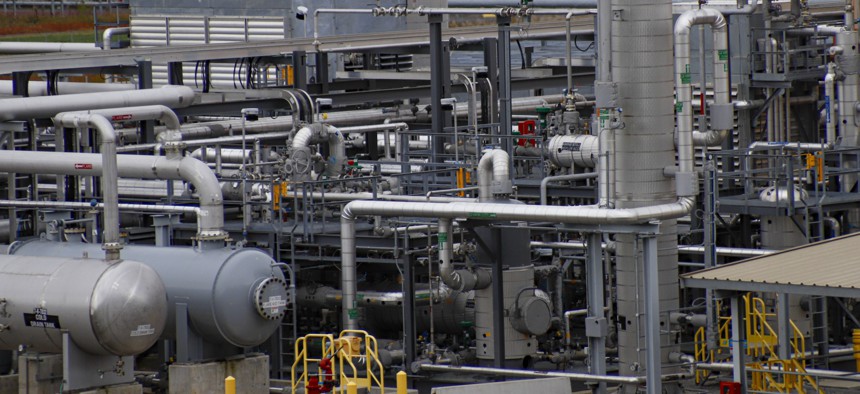Oil and Gas Group Bristles at Prospect of Fracking Ban

In this Oct. 17, 2019, photo, tanks and pipes move product through the MarkWest Bluestone Gas Processing Plant in Evans City, Pa. AP Photo/Keith Srakocic

Connecting state and local government leaders
Some Democratic contenders for the 2020 presidential nomination have voiced support for such a policy.
The leading group representing the nation’s oil and gas industry on Tuesday touted natural gas as a cleaner alternative to coal and staked out opposition to calls by Democratic presidential contenders to impose new restrictions on certain drilling.
Most of the candidates now vying for the 2020 Democratic presidential nomination have backed the idea of ending new oil and gas leases on public land. At least six—including Sens. Bernie Sanders and Elizabeth Warren—support a broad ban on hydraulic fracturing, or “fracking.”
These positions stand in sharp contrast to the Trump administration’s pro-fossil-fuel agenda, which at times has led to clashes with states over issues like vehicle emissions standards and pipeline permitting.
Mike Sommers, president and CEO of the American Petroleum Institute, spoke to reporters by phone Tuesday ahead of an annual event the group held in Washington, D.C.
"One of the most important environmental things that has happened in this country in the last 25 years was the fracking revolution and the fact that fracking has pushed the cost of natural gas down and it has become a replacement for coal,” he said.
“Some have made it their cause to stop American energy development,” Sommers added. “At the extreme, we hear promises on the 2020 campaign trail to ban fracking completely.”
He said that adopting a ban like this would lead to job losses, higher energy costs, and greater dependence on foreign energy sources.
API is making a case for fracking—and the gas and oil industry overall—at a time when natural disasters, like the massive wildfires burning across Australia and recent flooding, storms and wildfires here in the U.S., continue to draw attention toward the changing climate.
Cutting down on carbon emissions that come from burning oil, gas and coal is seen as a key step toward addressing climate change and the adverse consequences tied to it.
When it comes to fracking, climate change is not the only concern. There are also worries about the risks to public health and pollution in areas where this type of drilling is done.
On the climate front, global carbon dioxide emissions continued to rise last year, although at a slower pace than in the two prior years, based on estimates released last month by the Global Carbon Project.
In the U.S., greenhouse gas emissions fell slightly in 2019, according to figures the Rhodium Group, a private data research firm, published on Tuesday. The drop was due almost entirely to decreases in coal consumption, the firm’s report said.
Coal use has been falling in the U.S. for over a decade, in part due to the rise in natural gas. Natural gas is a cleaner source of fuel than coal and is also relatively abundant and inexpensive. But the surge in natural gas use has also contributed to rising emissions globally.
Some researchers have cautioned that natural gas will only hold promise as a viable “bridge” fuel, away from dirtier energy sources, if steps are taken to improve carbon emission capture and storage and to cut down on methane leaks from natural gas infrastructure.
Sommers emphasized that API understands “climate change is real" and said that addressing the issue will require a global response.
“We must meet the enormous and growing demand for affordable energy and we must produce and deliver it while achieving even lower emissions to address the risks of climate change,” he said.
Burning off and venting methane is another practice that oil producers have faced scrutiny over. The gas is a byproduct from oil wells.
Sommers said that it is not in the interest of companies to release or “flare” methane and that it would be preferable to capture the gas from oil wells so it can be sent to market. But he said the infrastructure is lacking to allow for this. “We know this is an issue,” he added.
At the state level, Sommers said some of the issues that API would be watching in the year ahead have to do with “severance” taxes, mandates for the mix of fuels that can be burned, and regulatory changes that affect how quickly gas and oil infrastructure can be built.
Bill Lucia is a Senior Reporter for Route Fifty and is based in Olympia, Washington.

NEXT STORY: Why the Air Force put Kubernetes in an F-16





